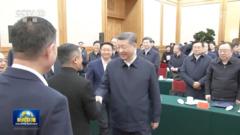In a surprising twist, Jack Ma, the revered founder of Alibaba, has made a noteworthy return to the public eye. His attendance at a high-profile symposium with Chinese President Xi Jinping earlier this week has ignited speculation about the future of China’s technology sector and its economy. Once a celebrated figure in the world of business, Ma stepped back from the limelight after making critical remarks about China’s financial industry in 2020.
The optics of Ma’s attendance, especially his position in the front row and his handshake with President Xi, has been interpreted as a significant sign of his rehabilitation within the upper echelons of Chinese business. Following the symposium, there was an immediate positive reaction in the stock market, particularly with Alibaba’s shares surging more than 8% in New York and witnessing a remarkable 60% increase year-to-date.
Experts and analysts are dissecting what this meeting represents not just for Ma personally, but for the tech industry at large. Notably, analysts like Bill Bishop pointed out that the sheer fact Ma participated in the event, albeit without taking the stage to speak, suggests a cautious yet meaningful reintegration into the public domain. Social media is buzzing with congratulations for Ma, with users expressing that his comeback could rejuvenate the Chinese economy.
Ma’s fall from grace began when he lamented the lack of innovation in state-owned banks, coining the controversial "pawn shop mentality," which led to the cancellation of a massive $34.5 billion IPO for Ant Group. This triggered a broader crackdown on the tech industry marked by increased regulations and scrutiny.
During the symposium, Xi Jinping stressed the need for innovation and growth in businesses, insinuating a reopening of doors for private enterprises and entrepreneurs. This message appears to convey a noticeable shift in policy, embracing a more accommodating stance towards the tech sector after years of stringent oversight. Analysts observe that Ma’s presence could signal Beijing's desire to foster growth and revitalize the private sector as an engine for economic recovery.
The atmosphere of the symposium featured a roster of notable figures from diverse tech companies, further emphasizing the importance of innovation in driving growth. The industry is looking towards a more prosperous future, particularly with the rising influence of domestic technologies, such as the newly launched DeepSeek AI chatbot. This innovation has sparked interest and investment in Chinese markets, proving that the nation can achieve significant milestones in tech independent of foreign influence.
As Ma reenters public life, the implications of his participation at such a pivotal event cannot be understated. Analysts believe it illustrates a controlled engagement from the government rather than an outright end to scrutiny, with a pointed emphasis on aligning private enterprise with national priorities, such as advancing semiconductors and renewable energy.
To summarize, Jack Ma's return to the forefront of China’s business landscape is laden with potential, signaling a new chapter for the tech industry amid evolving government policies. The focus appears to have shifted towards fostering growth while ensuring alignment with the country’s strategic directions, setting the stage for a new era of controlled yet innovative economic progress.




















